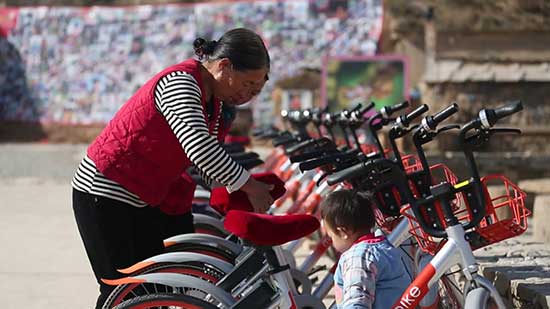


Qiqili Village is situated in the deep mountains in northern China. /CGTN Photo
Nearly every busy street in China's developed cities is crawling with bikes, making the phenomenon seem purely urban. With low fees, the rate at which people repeatedly use the bikes, or the repeat rate, has become the X factor for the business model's profitability.
This makes the experiment, where 20 shared bikes deployed in Qiqili, a backwater county plagued by poverty in north China’s Shanxi Province, look more charitable than ambitious.
Even the company in question, Mobike, one of the pioneers in the market, found the idea of connecting an impoverished village to the rest of the world with its service a little far-fetched.
It took village officials nearly six months to persuade the bike sharing company to agree to bringing in the shared bikes, which, they believe, could be a boost to local tourism.
“I’d lost count on how many times they (Mobike) had turned me down,” Guo Ruoqiao, the village’s chief official, told Shanxi Daily on October 24 when the bikes arrived.
Qiqili Village, located in the remote mountainous area in eastern Shanxi, has a population of less than 700. Eager to strike its name off the province’s list of the poorest places, the village has been attempting to develop local tourism in recent years.
Connecting different newly constructed tourist attractions are renovated roads where Guo is convinced that bike-sharing can fit the bill for potential visitors.
“You are welcome to cycle along the bank of the Yellow River," said Guo.

Villagers put some seat covers on the bikes./CGTN Photo
Whether the plan succeeds in drawing tourists remains to be seen, though the villagers adore the idea as well as the orange-colored vehicles, an embodiment of the sharing economy. In stark contrast to what has happened in urban areas where bike vandalism is constantly reported, villagers in Qiqili have taken good care of the bikes.
Some have put hand-sewn seat covers over the bikes, while some volunteer to the wipe the bikes from time to time to keep them clean.
“We’ve never expected such thing could happen in our village. We must treat them as treasures. In winter, we are not busy with farming," said Guo Chengmei, a local resident.
 Fire brigade in Shanghai holds group wedding
Fire brigade in Shanghai holds group wedding Tourists enjoy ice sculptures in Datan Town, north China
Tourists enjoy ice sculptures in Datan Town, north China Sunset scenery of Dayan Pagoda in Xi'an
Sunset scenery of Dayan Pagoda in Xi'an Tourists have fun at scenic spot in Nanlong Town, NW China
Tourists have fun at scenic spot in Nanlong Town, NW China Harbin attracts tourists by making best use of ice in winter
Harbin attracts tourists by making best use of ice in winter In pics: FIS Alpine Ski Women's World Cup Slalom
In pics: FIS Alpine Ski Women's World Cup Slalom Black-necked cranes rest at reservoir in Lhunzhub County, Lhasa
Black-necked cranes rest at reservoir in Lhunzhub County, Lhasa China's FAST telescope will be available to foreign scientists in April
China's FAST telescope will be available to foreign scientists in April "She power" plays indispensable role in poverty alleviation
"She power" plays indispensable role in poverty alleviation Top 10 world news events of People's Daily in 2020
Top 10 world news events of People's Daily in 2020 Top 10 China news events of People's Daily in 2020
Top 10 China news events of People's Daily in 2020 Top 10 media buzzwords of 2020
Top 10 media buzzwords of 2020 Year-ender:10 major tourism stories of 2020
Year-ender:10 major tourism stories of 2020 No interference in Venezuelan issues
No interference in Venezuelan issues
 Biz prepares for trade spat
Biz prepares for trade spat
 Broadcasting Continent
Broadcasting Continent Australia wins Chinese CEOs as US loses
Australia wins Chinese CEOs as US loses